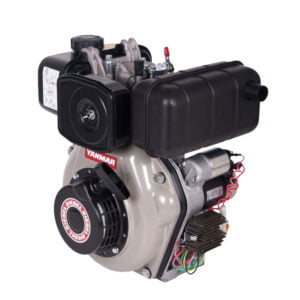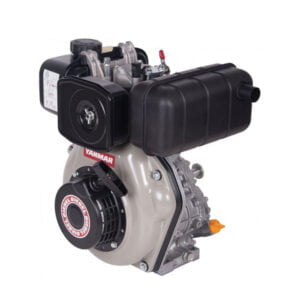
Stationary engines are critical for powering industrial equipment, pumps, generators, and other fixed applications. Proper maintenance is essential for maximizing the lifespan, efficiency, and reliability of both petrol and diesel stationary engines. Regular servicing and proactive care can prevent costly breakdowns, improve fuel efficiency, and ensure smooth operation for years. Here are essential maintenance tips to keep your stationary petrol and diesel engines in top shape.
1. Regular Oil Changes
- Oil lubricates engine components, reduces friction, and prevents overheating. Over time, oil degrades and accumulates contaminants, leading to engine wear.
- Petrol Engines: Change oil every 250–500 hours of operation, depending on manufacturer recommendations and load conditions.
- Diesel Engines: Change oil every 300–600 hours or based on heavy-duty usage. Diesel engines typically require more frequent oil changes due to soot and fuel contamination.
- Always use high-quality oil recommended by the manufacturer and replace the oil filter during each oil change.
2. Keep the Cooling System in Check
- Engines generate heat, and an efficient cooling system prevents overheating.
- Regularly check coolant levels and top up with the correct coolant mix.
- Flush and replace coolant as per the manufacturer’s service interval.
- Inspect radiator hoses for leaks and cracks.
- Ensure the thermostat and water pump are functioning correctly.
- Verify that cooling fans and ventilation systems are clear of obstructions.
3. Use High-Quality Fuel and Fuel Additives
- Poor-quality fuel can lead to engine knocking, carbon build-up, and injector clogging.
- Petrol Engines: Use fuel with the correct octane rating to prevent knocking.
- Diesel Engines: Use high-quality diesel to reduce carbon deposits and keep injectors clean.
- Consider fuel additives to clean injectors and improve combustion efficiency.
4. Air Filter Maintenance
- A clogged air filter restricts airflow, reducing engine efficiency and increasing fuel consumption.
- Check and clean the air filter every 250–500 hours.
- Replace it if heavily clogged, especially in dusty environments.
5. Fuel Filter Replacement
- Fuel filters prevent contaminants from reaching the engine, ensuring clean combustion.
- Petrol Engines: Change every 500–1,000 hours.
- Diesel Engines: Diesel engines are more sensitive to fuel contaminants; replace fuel filters every
300–600 hours.
6. Monitor Belts and Hoses
- Worn-out belts and hoses can cause engine overheating, loss of power, or system failures.
- Inspect the timing belt, serpentine belt, and radiator hoses for cracks, fraying, or looseness.
- Replace them as per manufacturer recommendations to prevent sudden failures.
7. Battery Maintenance
- A weak battery affects the starting performance and electrical systems.
- Clean terminals to prevent corrosion.
- Check the battery’s charge and replace it every 3–5 years.
- Ensure the alternator or charging system is functioning correctly.
8. Glow Plug and Spark Plug Maintenance
- Petrol Engines: Spark plugs ignite the air-fuel mixture and should be replaced every 500–1,000 hours, depending on type.
- Diesel Engines: Glow plugs assist in cold starts; replace them if starting issues arise.
-

L100N / L100V – Recoil Starter Assembly
$497.20 (Inc. GST) Add to cart -

L-Series Fuel Solenoid
$434.50 (Inc. GST) Add to cart -
Sale!

L48N Fuel Tank Assembly
$764.50Original price was: $764.50.$247.50Current price is: $247.50. (Inc. GST) Add to cart -

L48N / L48V – Recoil Starter Assembly
$434.50 (Inc. GST) Add to cart
9. Monitor Exhaust System and Emissions
- A failing exhaust system can reduce efficiency and increase emissions.
- Inspect the exhaust for leaks or blockages.
- Ensure the catalytic converter and DPF (Diesel Particulate Filter) are functioning properly.
- For diesel engines, regularly clean or regenerate the DPF to prevent clogging.
10. Avoid Excessive Idling and Inconsistent Load Operation
- Frequent idle periods and irregular load cycles can lead to carbon build-up and reduced lubrication.
- Avoid prolonged idling to prevent carbon deposits.
- Run the engine at optimal load conditions to maintain efficiency.
- Periodically operate the engine under load to burn off carbon deposits.
11. Follow the Manufacturer’s Maintenance Schedule
Every engine has specific maintenance intervals provided by the manufacturer. Following these
guidelines ensures longevity and optimal performance.
Conclusion
Taking care of your stationary petrol or diesel engine through regular maintenance not only extends its lifespan but also improves fuel efficiency and reduces the risk of costly repairs. Whether you operate a pump, generator, industrial machine, or fixed engine, these simple yet crucial maintenance tips will help keep your engine running smoothly for years. Prioritize preventive care, and your engine will reward you with reliable performance and longevity.
-
Sale!

Euro-tec Diesel ED40 – 4HP
$1,424.50Original price was: $1,424.50.$1,094.50Current price is: $1,094.50. (Inc. GST) Add to cart -
Sale!

Euro-tec Diesel ED60 – 5.5HP
$1,925.00Original price was: $1,925.00.$1,595.00Current price is: $1,595.00. (Inc. GST) Add to cart -
Sale!

Euro-tec Diesel ED100 – 10HP
$2,634.50Original price was: $2,634.50.$2,194.50Current price is: $2,194.50. (Inc. GST) Add to cart -
Sale!

Euro-tec Diesel ED210 – 21HP
$7,694.50Original price was: $7,694.50.$6,594.50Current price is: $6,594.50. (Inc. GST) Add to cart







